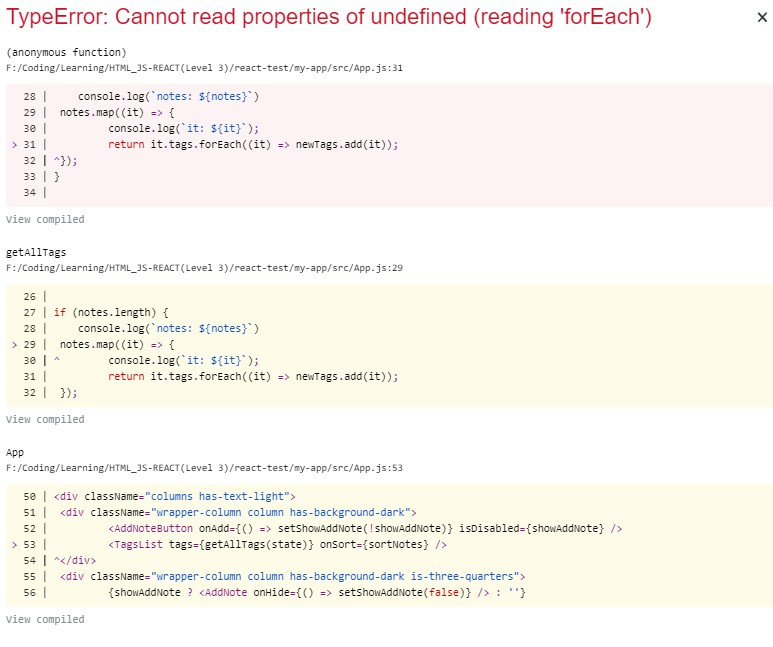Answer the question
In order to leave comments, you need to log in
How to get state via fetch?
Tell me, where is the mistake? I can't get data from the server correctly.
I am using jsonserver npm. Now [object Object], [object Object], [object Object] comes to my state, and accordingly everything falls. In this case, after the fetch, the console shows the correct array.
The json file looks like this:
{
"notes": [
{
"id": 1,
"title": "First note",
"text": "first text",
"tags": [ "movies", "books", "thoughts" ],
"editing": false
},
{
"id": 2,
"title": "Second note",
"text": "Second text",
"tags": [ "goals" ],
"editing": false
},
{
"id": 3,
"title": "Third note",
"text": "Another one text",
"tags": [ "goals", "soccer", "poker" ],
"editing": false
}
]
}//action creators
export const fetchNotes = () => {
return async (dispatch) => {
fetch('http://localhost:5000/notes/').then((res) => res.json()).then((json) => {
console.log(json); // вот здесь нормальный массив
dispatch({
type:'loadNotes',
payload: json
});
});
};
};
// reducers
let initialState = [];
const reducer = (state = initialState, action) => {
switch (action.type) {
case 'loadNotes':
return [ ...state, action.payload ];
default:
return state;
}
};
export default reducer;
// store
export const store = createStore(reducers, {}, applyMiddleware(thunk));
//index.js
ReactDOM.render(
<React.StrictMode>
<Provider store={store}>
<App />
</Provider>
</React.StrictMode>,
document.getElementById('root')
);
//app.js
const App = () => {
const state = useSelector((state) => state.notes);
const dispatch = useDispatch();
useEffect(() => {
dispatch(fetchNotes());
}, []);
console.log(`state: ${state}`);
const [ showAddNote, setShowAddNote ] = useState(false);
const [ tags, setTags ] = useState([]);
// Get all tags
const getAllTags = (notes) => {
const newTags = new Set();
if (notes.length) {
console.log(`notes: ${notes}`)
notes.map((it) => {
console.log(`it: ${it}`); // А тут и далее [object Object],[object Object],[object Object]
return it.tags.forEach((it) => newTags.add(it));
});
}
return [ ...newTags ];
};
const filteredNotes = state.filter((note) => {
return !tags.length || tags.find((item) => note.tags.includes(item));
});
//Sort notes
const sortNotes = (checked, value) => {
setTags(!tags.includes(value) && checked ? [ ...tags, value ] : tags.filter((n) => n !== value));
};
return (
<div className="wrapper has-background-dark">
<div className="container is-fluid">
<div className="columns has-text-light">
<div className="wrapper-column column has-background-dark">
<AddNoteButton onAdd={() => setShowAddNote(!showAddNote)} isDisabled={showAddNote} />
<TagsList tags={getAllTags(state)} onSort={sortNotes} />
</div>
<div className="wrapper-column column has-background-dark is-three-quarters">
{showAddNote ? <AddNote onHide={() => setShowAddNote(false)} /> : ''}
<NotesList notes={filteredNotes} />
</div>
</div>
</div>
</div>
);
};
export default App;
Answer the question
In order to leave comments, you need to log in
Didn't find what you were looking for?
Ask your questionAsk a Question
731 491 924 answers to any question